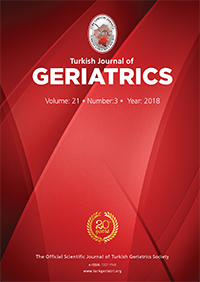2Necmettin Erbakan University, Faculty of Health Sciences, Department of Nursing Public Health Nursing, Konya, Turkey DOI : 10.31086/tjgeri.2018344060 Introduction: Rapid increase in the older persons population and accompanying sociodemographic changes result in family caregiving problems, thereby impelling the older persons and their family to opt for nursing care institutions. Because of insufficient nurses working in nursing homes, healthcare assistants usually care for the older persons. This study assessed the attitudes of healthcare assistants toward the older persons and ageism.
Materials and Method: This descriptive study assessed the attitudes of 108 healthcare assistants working in a public nursing home using Kogan"s Attitudes Toward Older People (KAOP) scale and Ageism Attitude Scale (AAS).
Results: The mean age of the 108 healthcare assistants was 40.1±7.7 years. These individuals are 58.3% male, 85% are married and 62% are primary school graduates. The mean duration of employment of the participants at the nursing home was 80.1±56.9 months, and 91.7% had caregiving certificates. Participants had positive attitudes based on their total KAOP and AAS scores and sub-dimension AAS scores. KAOP scores varied according to sex and living with an older persons from the family, whereas AAS scores varied according to sex, income status, living with an older persons from the family, considering training for senior care a necessity, and educational background. According to hierarchical regression analysis for determining the variability of the total AAS score, Model 1 (sociodemographic variables) predicted 25.6% and Model 2 (sociodemographic, caregiving certificate, duration of employment) predicted 28.4% of the AAS scores.
Conclusion: Attitudes of healthcare assistants toward the older persons and ageism are positive. Educational background, gender, and income level are predictive variables for ageism.
Keywords : Nursing home; Attitude; Aged; Ageism
